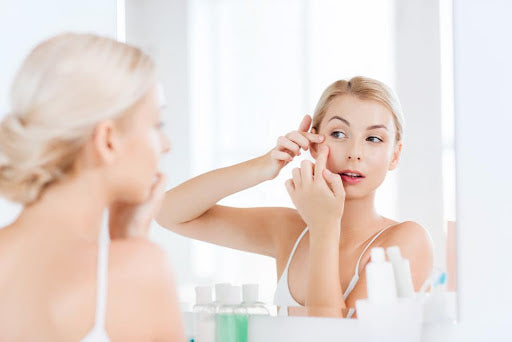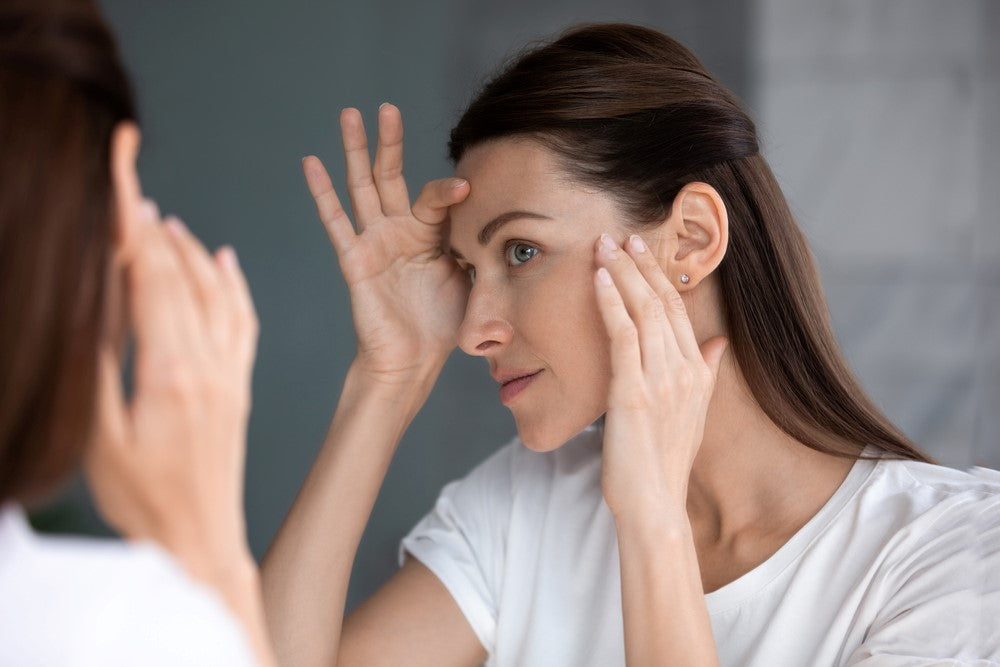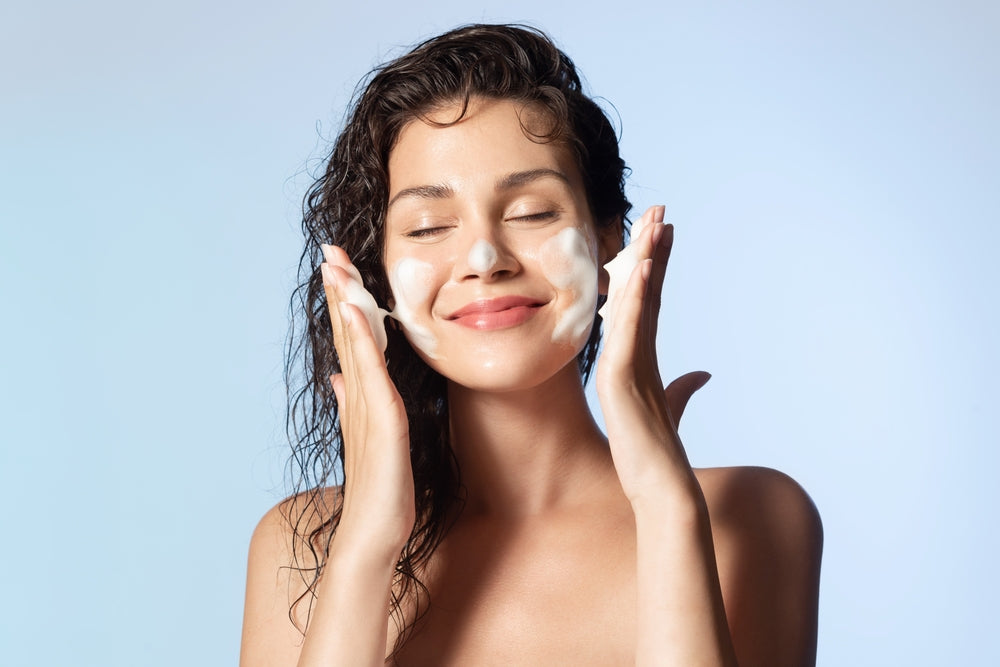Maintaining healthy and beautiful skin requires more than just using skincare products. Our daily habits and routines play a significant role in the overall health and appearance of our skin. Unfortunately, some common habits can inadvertently damage and sabotage our skin goals.
In this blog post, we will highlight five bad skincare habits that you should avoid to protect and preserve your skin's health.
Sleeping with Makeup On
Sleeping with makeup on can have several negative effects on our skin. Here are some of the consequences of not removing makeup before going to bed:
-
Clogged Pores: Makeup, along with dirt, oil, and environmental pollutants, can accumulate on the skin's surface throughout the day. When left overnight, these substances can clog the pores, leading to the formation of blackheads, whiteheads, and acne breakouts.
-
Skin Irritation and Sensitivity: Some makeup products contain ingredients that may be irritating to the skin. Leaving these products on for an extended period can further aggravate the skin, causing redness, inflammation, and sensitivity. This is particularly true for individuals with sensitive skin or those prone to skin conditions like rosacea or eczema.
-
Dull and Tired-Looking Skin: Makeup can create a barrier on the skin, preventing it from naturally renewing and regenerating itself during sleep. As a result, the accumulation of dead skin cells and the lack of oxygen can make the skin appear dull, tired, and lackluster.
- Dryness and Dehydration: Many makeup products, especially those with matte finishes or long-wearing formulas, can be drying to the skin. Sleeping with these products on can exacerbate dryness, leading to flaky, rough, and dehydrated skin.
-
Premature Aging: The accumulation of makeup residue, combined with free radicals and pollutants, can contribute to oxidative stress and premature aging of the skin. Over time, this can result in the appearance of fine lines, wrinkles, and a loss of skin elasticity.
-
Eye Irritation and Infections: Leaving eye makeup on overnight, such as mascara and eyeliner, can increase the risk of eye irritation and infections. These products can transfer onto the delicate skin around the eyes and clog the hair follicles, leading to styes or eye infections.
- Impaired Skin Barrier Function: Sleeping with makeup on disrupts the skin's natural barrier function. This barrier helps retain moisture, protect against environmental aggressors, and maintain overall skin health. When compromised, the skin becomes more susceptible to dryness, irritation, and damage.
To maintain healthy skin, it is essential to cleanse your face thoroughly before bedtime to remove all traces of makeup.
Use a gentle cleanser suitable for your skin type, followed by a hydrating moisturizer to replenish moisture and support the skin's overnight repair process. By practicing good makeup removal habits, you can help your skin stay clear, balanced, and vibrant.

Skipping Sunscreen
Skipping sunscreen can have significant consequences for the health and appearance of your skin. Here are some of the effects of not using sunscreen:
-
Sunburn: Sunburn is one of the immediate effects of skipping sunscreen. Exposure to the sun's harmful ultraviolet (UV) rays can cause the skin to become red, inflamed, and painful. Sunburns increase the risk of skin damage and contribute to long-term skin issues.
-
Premature Aging: UV radiation is a major contributor to premature aging of the skin. Skipping sunscreen allows UV rays to penetrate the skin, leading to the breakdown of collagen and elastin fibers, which are responsible for the skin's firmness and elasticity. This can result in the appearance of wrinkles, fine lines, age spots, and sagging skin.
-
Increased Risk of Skin Cancer: Prolonged exposure to UV rays without protection increases the risk of developing skin cancer, including melanoma, the most dangerous form of skin cancer. Sunscreen helps to shield the skin from harmful UVA and UVB rays, reducing the risk of skin cancer development.
-
Hyperpigmentation and Uneven Skin Tone: UV exposure triggers the production of melanin, the pigment responsible for skin color. Without sunscreen, the skin is more prone to developing patches of hyperpigmentation, such as sunspots or melasma. This can lead to an uneven skin tone and diminish the overall clarity of the complexion.
-
Weakened Skin Barrier: UV radiation can compromise the skin's natural barrier function, making it more susceptible to dryness, irritation, and sensitivity. A weakened skin barrier may also allow environmental pollutants and allergens to penetrate the skin more easily, exacerbating existing skin conditions or triggering new ones.
-
Sun Sensitivity and Allergic Reactions: Without proper sun protection, individuals with sun-sensitive skin or certain skin conditions like rosacea or eczema may experience increased sensitivity and flare-ups. Moreover, some individuals may be allergic to specific sunscreen ingredients, so it is important to choose a sunscreen formulation suitable for your skin type and preferences.
- Worsening of Existing Skin Conditions: For those with existing skin conditions like acne or rosacea, skipping sunscreen can exacerbate these conditions. UV exposure can trigger inflammation and aggravate skin sensitivity, leading to more frequent breakouts and redness.
To protect your skin from the harmful effects of the sun, it is essential to wear a broad-spectrum sunscreen with a sun protection factor (SPF) of 30 or higher, regardless of the weather or season.
Apply sunscreen generously to all exposed areas of the skin, including the face, neck, hands, and any other uncovered body parts. Reapply every two hours, or more frequently if sweating or swimming.
By incorporating sunscreen into your daily skincare routine, you can safeguard your skin's health and maintain its youthful appearance.
It is also worth noting that there are many other effective ways to prevent premature wrinkles by incorporating nanofiber melting collagen skincare into your skincare routine
Over-Exfoliating
Over-exfoliating the skin can have various negative effects on its health and appearance. Here are some of the consequences of over-exfoliation:
-
Skin Irritation and Sensitivity: Excessive exfoliation can strip away the skin's natural oils and disrupt its protective barrier. This can result in skin irritation, redness, inflammation, and increased sensitivity. The skin may feel tight, dry, and uncomfortable.
-
Dryness and Dehydration: Over-exfoliating can disrupt the skin's moisture balance, leading to excessive dryness and dehydration. Removing too many layers of dead skin cells can compromise the skin's ability to retain moisture, resulting in flakiness, rough texture, and a dull complexion.
-
Increased Oil Production: Paradoxically, over-exfoliating can stimulate the skin to produce more oil as a protective mechanism. The skin may react by producing excess sebum to compensate for the loss of natural oils, leading to an oilier complexion and potentially clogged pores.
-
Breakouts and Acne: Aggressive or frequent exfoliation can disrupt the skin's natural healing process, leading to an increased risk of breakouts and acne. Over-exfoliation can strip away the skin's protective barrier, allowing bacteria and dirt to enter the pores, leading to inflammation and the formation of pimples.
-
Increased Sensitivity to Sun Damage: Over-exfoliated skin can be more susceptible to sun damage. Removing the top layer of the skin leaves it more vulnerable to UV rays, increasing the risk of sunburn, sunspots, and other signs of photoaging.
- Thin and Fragile Skin: Excessive exfoliation can thin out the skin over time, making it more fragile and prone to damage. The skin's protective barrier is compromised, making it less resilient and more susceptible to environmental aggressors.
- Worsening of Skin Conditions: Over-exfoliation can exacerbate existing skin conditions such as acne, rosacea, eczema, or psoriasis. Excessive stimulation and irritation can trigger flare-ups and increase inflammation in these conditions.
To avoid the negative effects of over-exfoliation, it is essential to practice gentle and moderate exfoliation.
Follow the recommended guidelines for your skin type and choose exfoliating products that suit your needs. Opt for gentle exfoliants with mild ingredients, and limit exfoliation to 1-2 times per week.
Listen to your skin's response and adjust the frequency or intensity of exfoliation accordingly. Remember to moisturize and protect your skin with sunscreen after exfoliating to maintain its health and integrity.
Not Removing Makeup Properly
Not removing makeup properly can have several negative effects on the skin. Here are some of the consequences:
-
Skin Irritation and Inflammation: Some makeup products contain ingredients that can be irritating to the skin, especially if left on for an extended period. Incomplete makeup removal can leave these irritants on the skin, leading to redness, itching, and inflammation.
-
Dull and Uneven Skin Tone: Makeup residue left on the skin can create a barrier, preventing the natural process of cell turnover and skin rejuvenation. This can result in a dull and uneven complexion, making the skin appear tired and lackluster.
-
Dryness and Dehydration: Many makeup products, particularly those with long-wearing or matte formulas, can be drying to the skin. Failing to remove these products properly can exacerbate dryness, leading to flaky, rough, and dehydrated skin.
-
Accelerated Aging: Leaving makeup on overnight can contribute to premature aging of the skin. Makeup, combined with free radicals and pollutants from the environment, can cause oxidative stress and damage to the skin cells, leading to the formation of fine lines, wrinkles, and a loss of skin elasticity.
-
Eye Irritation and Infections: Failure to remove eye makeup properly can lead to eye irritation and potential infections. Mascara and eyeliner left on the lashes and eyelids can transfer onto the delicate eye area, increasing the risk of eye irritation, redness, and even infections like conjunctivitis.
- Impaired Skin Barrier: Makeup residue left on the skin can disrupt the natural barrier function, which helps retain moisture and protect against environmental aggressors. When the skin barrier is compromised, the skin becomes more susceptible to dryness, irritation, and damage.
- Acne Breakouts: If makeup is not removed properly, it can contribute to the development of acne. The combination of makeup, oil, and bacteria can clog pores, leading to the formation of new breakouts or worsening existing acne.
To avoid the negative effects of not removing makeup properly, it is essential to follow a thorough and gentle makeup removal routine.
Use a suitable makeup remover or cleansing oil to dissolve and remove makeup from the face, eyes, and lips. Follow up with a gentle facial cleanser to ensure all traces of makeup are eliminated. Finish with a hydrating moisturizer to nourish the skin.
Taking the time to properly remove makeup will help keep your skin clean, healthy, and free from potential issues.
Picking at Your Skin
Picking at the skin, whether it's pimples, blackheads, or scabs, can have detrimental effects. Here are some of the consequences of picking at the skin:
-
Inflammation and Redness: Picking at the skin can cause inflammation and redness. It disrupts the skin's natural healing process and can lead to increased blood flow to the area, resulting in visible redness and irritation.
-
Delayed Healing: Picking at blemishes or scabs can interfere with the natural healing process of the skin. It can break open the skin, exposing it to bacteria and further damage. This can prolong the healing time and increase the risk of infection.
-
Scarring and Hyperpigmentation: Picking at the skin can cause damage to the deeper layers, leading to scarring. It can result in the formation of dark spots or hyperpigmentation, especially in individuals with darker skin tones. These marks can be stubborn and take a long time to fade.
-
Spread of Bacteria: Picking at the skin can introduce bacteria from the hands and nails into the open wounds or pores. This can lead to the spread of infection, inflammation, and potential breakouts in adjacent areas.
-
Skin Infections: Picking at the skin can create open wounds that are susceptible to infection. Bacteria from the hands or the surrounding environment can enter the skin, leading to various infections, including cellulitis or abscesses.
-
Post-Inflammatory Hyperpigmentation (PIH): Picking at acne lesions can result in post-inflammatory hyperpigmentation. This refers to the darkening of the skin in the affected area, which can persist long after the blemish has healed.
-
Psychological Impact: The act of picking at the skin can become a compulsive behavior and lead to negative psychological effects. It can contribute to feelings of shame, guilt, or low self-esteem, especially when scarring or hyperpigmentation occurs.
- Spreading the Problem: Picking at acne or blemishes can spread the problem further. Squeezing one pimple can release its contents onto nearby skin, leading to the development of new blemishes in that area.
To promote healthy skin and prevent these negative effects, it is important to resist the urge to pick at the skin.
Instead, adopt proper skincare practices, including regular cleansing, exfoliation, and the use of targeted acne treatments.
If you struggle with compulsive skin picking, consider seeking professional help from a dermatologist or therapist who can provide guidance and support.

Conclusion
Taking care of your skin involves more than just applying products.
It's essential to cultivate good skincare habits and avoid detrimental practices that can harm your skin. By eliminating bad skincare habits such as sleeping with makeup on, over-exfoliating, skipping sunscreen, picking at your skin, and using harsh products, you can protect your skin's health, maintain its natural balance, and promote a radiant and youthful complexion.
Incorporate collagen skincare products, such as collagen creams and collagen essence mist, into your positive skincare habits and commit to a consistent and gentle skincare routine to achieve and maintain healthy, glowing skin in the long run.




